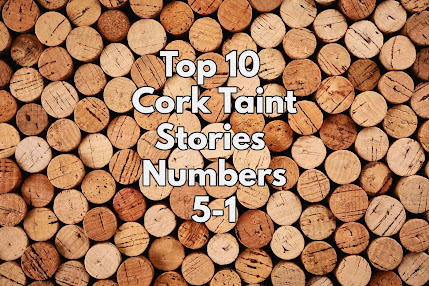Last week, I detailed the first half of my Top 10 all-time cork taint stories. Today, I bring you numbers 5 to 1. Read more about what cork taint is here.
5. Cork tainted bottle at a retail consumer tasting event
Back in 2001, I was at a tasting of Napa Valley wines at a retail wine shop in Seattle. We had all paid to attend the event, where numerous wines $100 and up were being poured. Everyone was giddy with excitement.
Two wine stewards went around pouring the wines to the group of people standing together. Then they gave a few moments for everyone to taste and appreciate the wine before we talked about it
“What do you all think?” one of the stewards asked after a few moments regarding the wine in our glass.
“It’s corked,” a voice said from the back of the group.
The wine steward looked at him quizzically for a moment, put his nose back in the glass, raised it up, and pronounced “It’s corked.”
The crowd audibly gasped in horror. I’m sure for many, it was their first experience with this producer. I’m also sure it was an experience that they told their friends.
4. Cork tainted bottle for review
Back when I first started reviewing for Wine Enthusiast (I was a contributing editor at the magazine from 2013 until mid-2022), I tasted a wine and thought it was good but by no means great. I gave it a middling score. When I pulled the bottle from the bag that was concealing the identity of the producer, I was quite surprised.
The bottle came from a very highly regarded producer in an exceptional vintage. I tasted the wine again to see if I’d made some grievous error, but my impression was the same.
Later, I poured the wine for my wife. As I noted in my previous article on numbers 10 through 6, my wife is more sensitive to cork taint than I am.
“What do you think of this wine?” I asked. “It’s okay,” she replied with indifference. I showed her the label, and her eyebrows arched in surprise.
The next day, I came back to the bottle. Now, it was now very obviously cork tainted. (Cork taint at low levels can become more apparent as a wine opens up.) I put a second bottle of the same wine back into my blind flights. There was a five point swing in score for the wine.
Have I had other bottles of corked wine where the taint has been enough to impact the score but not high enough for me to detect? I taste enough wine that the chances are 100%.
3. Cork tainted bottle with the winemaker
One year I was tasting a series of new releases with a winemaker. He knew that cork taint was a crusade of mine. I asked him how he approached dealing with the issue and how he thought the winery was doing overall in that regard.
He detailed the steps that the winery took to reduce the problem. He also noted that the winery had just had its spring release event the weekend before and had opened up eight cases of each wine, and none of the bottles were corked.
“I think we’re doing pretty well,” he said with confidence.
I put my nose into the glass of wine he had just poured, then pulled it up and said, charitably, “I think this wine is corked.”
What are the chances that this winery had poured all those bottles on their release weekend that had seemed fine, yet I just happened to get a corked bottle on this day at that exact moment? Not high.
BONUS: Cork tainted bottle at a Taste Washington seminar
Years back, I was moderating a seminar at Taste Washington, a consumer tasting event. Right before the seminar, the husband of a friend of mine said “I think one of the wines is corked.”
In what was in retrospect an embarrassing reenactment of my experience detailed in #6 with the roles reversed, I took the glass and smelled it. I did not detect any cork taint. I said “I’m sorry. I don’t notice anything.” The seminar was close to starting, so I went up to the front to be ready.
Of course, when we got to that wine in the tasting, someone seated near the same person said “This wine is corked.” Realizing there was a problem, I said “How many people are noticing cork taint on this wine?” A row of hands went up from everyone who had obviously received wine from the same bottle. I called in the service team, who I should note had originally proofed the wine, and they re-poured it.
Lesson learned: There is always someone who is more sensitive to cork taint than you are, and when they say a wine is corked, it’s best to believe them lest you embarrass yourself, as I did.
2. Cork tainted wine at a wine bar before dinner
My wife and I were out for a rare night on the town. We were going to dinner downtown, and then we were going to see a movie. We were thrilled to be out and about.
We took a bus downtown and arrived about 25 minutes ahead of our dinner reservation. “Why don’t we go and grab a quick glass of wine at [a particular wine bar]?” I suggested. My wife agreed.
We entered the restaurant and went to the bar. Offered drink menus, we looked at them hurriedly and made a selection, as we just had time for a quick drink. My glass came out, and it was cork tainted. This was, of course, disappointing.
I tried to get the bartender’s attention, as the clock was ticking. He apologized and poured me a new glass from a different bottle. I smelled it quickly, pronounced it fine, and let him go on his way. However, as I went back to it, I realized that it too was cork tainted. (Cork taint blocks olfactory signal transduction; it is not uncommon to smell it one moment and then not the next or vice versa for this reason.)
“Why don’t you ask for another glass?” my wife suggested. “We’re out of time at this point,” I replied with disappointment.
When the waiter brought the check, I said to him “It’s my mistake so I’m happy to pay for the glass, but just to let you know, the second bottle was actually corked too.”
He apologized, and I told him not to worry about it, as I didn’t pick the taint up when I checked the wine. He asked if I would do him the favor of smelling a glass from a third bottle of the wine. I obliged. It too was cork tainted.
“You know, we got a screaming deal on that wine,” he said shaking his head. “Well, now you know why,” I replied.
1. Cork tainted 100th month anniversary wine at a high-end restaurant
Since my wife and I started dating, we celebrate on the same day each month that we first started dating. As we approached our 100th month anniversary, we discussed how exactly we should celebrate. On the one hand, it was a wonderful milestone. On the other, finances were tight at that moment.
We discussed over a series of days whether we should stay in and do something special at home or splurge and go out to dinner. After much handwringing, we decided to go out.
My wife crowdsourced people’s suggestions for top local restaurants, we researched, and we decided on one. It was a quite expensive, extremely well-regarded restaurant neither of us had been to before.
We were, again, very excited to be out on the town. We decided to start the evening with two glass pour wines. Mine came back and was, of course, corked. It was a tough start to the evening, but these things unfortunately do happen.
When the waiter came back, I informed him that the wine was corked and asked if he could open a fresh bottle and bring another glass. He took the glass away. I watched as he and the bartender discussed the situation for some time. Then he came back to the table.
“I talked to the bartender, and he said it’s actually not [corked]. That’s the way the wine is supposed to smell.”
I was completely stunned. “No. I actually write about wine for a living. It’s corked,” I said.
“Well, you clearly don’t like the wine. Why don’t you try something else?” the waiter suggested.
At this point, I was thinking about how big of a deal I really wanted to make this. Should I say “No. I want the wine that I asked for. This is a $12 glass pour wine for goodness sakes! Open another bottle!” Instead, I told the server to bring me something else.
My wife and I were both quite upset, and the evening was clearly ruined at this point. But we had ordered our meal. Leaving was not an option.
We sat at the table, both of us shocked. I was seething. When the meal came, we quickly ate it and left. The food was some of the best I’ve ever had in my life, but I can’t say that I experienced much enjoyment. Best of all, given the auto-gratuity at the restaurant, I paid the server $60 to insult me and upset my wife.
We decided when we got home that clearly we should have decided to stay in. Later, my wife and I both independently wrote the owner, encouraging him to better train his service staff regarding cork taint.
He replied apologetically and offered us a free meal at the restaurant. After thinking about it, we decided that we didn’t really have any interest in going back to the restaurant again, even for free. As you can imagine, we have both talked about this experience to a very large number of our friends whenever that restaurant comes up.
* * *
These are just some of the experiences that wineries using natural cork are giving to customers. They are my top 10 stories. I could write another ten or even a Top 40. These were all experiences marred by cork taint.
On the one hand, many people will say “Well, cork taint happens,” and throw up their hands. That is wrong.
Cork taint is a decision winemakers make. There are alternatives available that are guaranteed to be TCA free. Some of these alternatives have existed for decades.
Yet many winemakers don’t avail themselves to these alternatives because they want to use natural cork for one reason or another (consumers are used to it, they like the way wines age under it, etc.). So they accept defrauding a significant percentage of customers, when they know 3-6% of their corks will be contaminated by TCA. (Some deny that number is correct, but even the Cork Quality Council’s studies indicate that is about right.)
This might seem overly harsh or dramatic, but it is not. Selling a product that you know to be faulted is fraud.
Imagine going to the grocery store and arriving home and finding that 5% of the food you bought was inedible due to some contaminant. You bring this to the attention of the store, and they say, “Well, this is to be expected.” It would be an outrage. Yet somehow, when it comes to cork taint, we have been told we should expect it. Worse still, we have been told to accept it. A lot of people even believe that!
That is wrong. These experiences do not need to happen. It just takes winemakers no longer ignoring the magnitude of the problem and availing themselves to solutions.
It also takes cork companies accepting responsibility for their end of this failure and not offering what they know to be a defective product. Cork companies also shouldn’t be charging wineries higher prices to “guarantee” their corks are free of TCA (trichloroanisole, the main contaminant that causes cork taint). Imagine buying something and having the company say “Would you like to pay substantially more to make sure you’re actually getting what you’re paying for?”
Bottom line, after decades of foisting cork tainted wines upon consumers – truly filling cellars with them – wine lovers deserve a lot better.
Next up on this topic, reader experiences with cork taint. Leave a comment here, email me at [email protected], or post your story on Facebook, Instagram, or Twitter. I’ll anonymize the stories and post some of them here in a subsequent article.








Leave A Comment